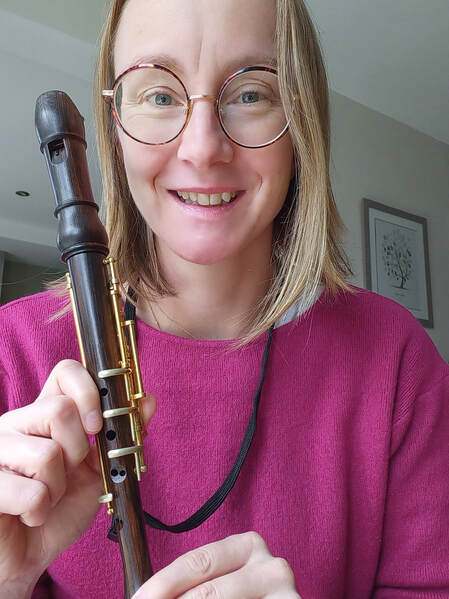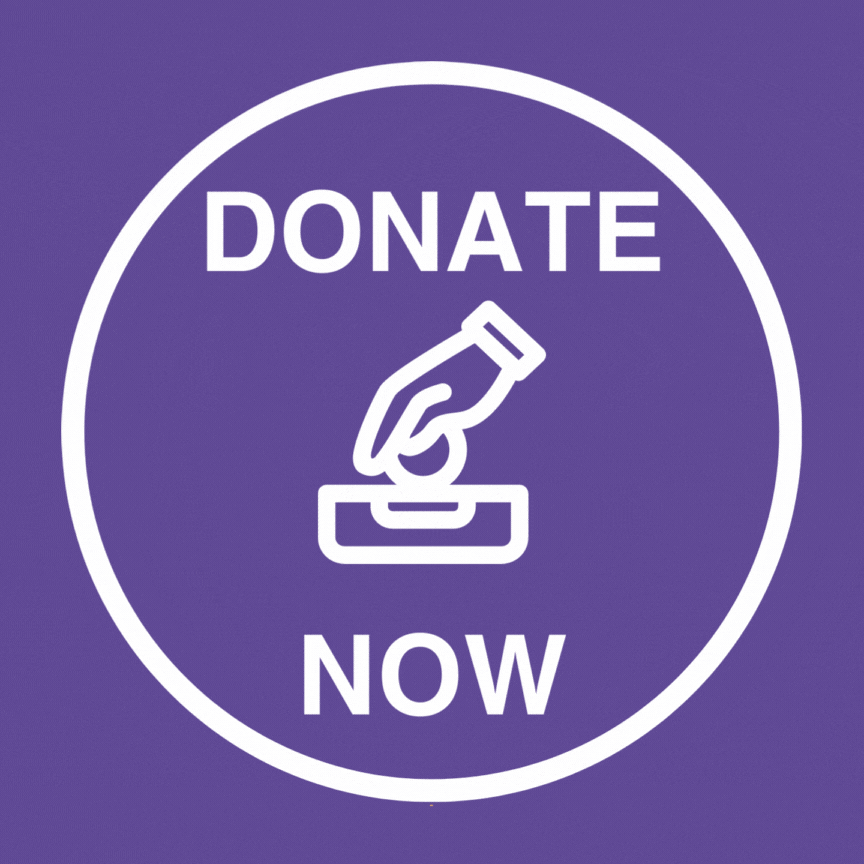Case study: Making my 8-year old self proud of her recorder accomplishments!The story of Emmy
|
Emmy was born with left-sided hemiparesis, a type of cerebral palsy, which meant that she could only get so far with her recorder playing at primary school. Now aged 40 and having recently discovered the one-handed recorder, she’s on a mission to carry on where she left off as she describes…
“Cerebral palsy is a broad term that refers to abnormalities in motor control which occurs from a brain injury around the time of birth. I have hemiparesis which means the left side of my body is weaker, notably my left leg and I have poor fine motor control in my left hand.
Whilst the structure of my eyes is okay, my brain injury means my brain cannot process images in my left visual field, so I am partially sighted.
These two conditions had a massive impact on my ability to play music.
I still have terrible memories of playing the recorder at school. I tried to play by using my right hand at the top of the recorder, but this meant that I could only get as far as playing a few notes and had to stay silent for some other notes. I was neither encouraged nor discouraged from playing the recorder - mainly, my inability to play was ignored
I wasn’t able to keep up and progress with my peers onto the tenor recorder and beyond. It had a profound effect – not least on my confidence –particularly as I really loved playing a musical instrument. In fact, I've always been amazed how much music a human being can emanate and fill a room with an instrument and how silent the room is when they stop!
We don’t tend to talk about learning musical instruments after primary school so my desire to make music was left abandoned. That was until I turned 32 and went through my first childbirth and all the medical inventions that entails. It was only then that I learnt more about my different conditions and found the words to describe them and I finally embraced my differences.
That led me to playing the ukulele, which I re-strung to be able to play with my right instead of left hand. I learnt a few chords and a few songs. Then, a couple of years ago I saw the wonderful Sarah Jeffrey talking about the one-handed recorder and it really sparked something in me. I revisited the idea again recently and saw that Sarah had done another video with a 3D printed version.
Maybe it was because she was talking about a 3D-printed instrument which seemed really exciting (also because the version she was demonstrating was pink) but I just loved it! I also noticed that Sarah had a recorder at her home in the Netherlands. As I live in France, I wondered whether the charity would be able to support me in a similar way. As it turned out, I was due to visit my parents in Wales in November so it was easy to arrange delivery of the instrument there.
Courtesy of the OHMI Instrument Hire Scheme, I’ve now had my one-handed instrument for about a month and nearly finished the first book which Rachel recommended, Red Hot Recorder by Sarah Watts. OHMI provided the stickers to put over the notes to show how to adapt the music.
Getting past the first three fingers of playing (the level I’d managed to reach as a primary school pupil) was very emotional. Hitting an F Sharp was a particular highlight! It has made the eight-year-old in me very happy. I don’t know yet what I want to achieve although I am encouraged that there is now the opportunity to learn and be assessed online through organisations such as Trinity College London.
I’ve chosen to learn the descant recorder for two key reasons: there seems to be more beginner material available and I already had some very rusty memories of the musical notes. That said, I guess I do have a quiet goal that I might join the marching band where I live in France as their only English-speaking, one-handed recorder player! Similarly, there is also a music school nearby and part of my plan is to approach them with the aim of studying lessons.
I think part of having a disability is showing resilience and resourcefulness because, quite honestly, there is very little that isn’t challenge. When you realise you have to consider everything in the context of what you can do rather than what you’d like to do, it can be quite limiting as a person with a disability.
Being able to play the recorder at this stage of my life, when I previously thought it wasn't possible, really has been life-affirming and I’ve thoroughly enjoyed showing my two young daughters, Clara and Eloise, how the instrument works and also playing along with their music making. My mum kept my original recorder and my girls now play that.
It’s probably taken me eight years to accept my condition but certainly now the recorder has given me a real energy to set myself new goals.
I absolutely love my instrument and its keys make it feel quite special.
Rachel, OHMI’s General Manager, has been so enthusiastic, encouraging and, dare I say, ‘gung-ho’ in her support. That’s really important and when you’re faced with such a scary proposition of jumping into the unknown. But now I’ve made that leap, there’s no looking back…”
You can listen to Emmy playing 'Deep Swing’ (track 53 in the Red Hot Recorder Tutor 1 book by Sarah Watts):
https://youtu.be/YLBxF4peqPY
Whilst the structure of my eyes is okay, my brain injury means my brain cannot process images in my left visual field, so I am partially sighted.
These two conditions had a massive impact on my ability to play music.
I still have terrible memories of playing the recorder at school. I tried to play by using my right hand at the top of the recorder, but this meant that I could only get as far as playing a few notes and had to stay silent for some other notes. I was neither encouraged nor discouraged from playing the recorder - mainly, my inability to play was ignored
I wasn’t able to keep up and progress with my peers onto the tenor recorder and beyond. It had a profound effect – not least on my confidence –particularly as I really loved playing a musical instrument. In fact, I've always been amazed how much music a human being can emanate and fill a room with an instrument and how silent the room is when they stop!
We don’t tend to talk about learning musical instruments after primary school so my desire to make music was left abandoned. That was until I turned 32 and went through my first childbirth and all the medical inventions that entails. It was only then that I learnt more about my different conditions and found the words to describe them and I finally embraced my differences.
That led me to playing the ukulele, which I re-strung to be able to play with my right instead of left hand. I learnt a few chords and a few songs. Then, a couple of years ago I saw the wonderful Sarah Jeffrey talking about the one-handed recorder and it really sparked something in me. I revisited the idea again recently and saw that Sarah had done another video with a 3D printed version.
Maybe it was because she was talking about a 3D-printed instrument which seemed really exciting (also because the version she was demonstrating was pink) but I just loved it! I also noticed that Sarah had a recorder at her home in the Netherlands. As I live in France, I wondered whether the charity would be able to support me in a similar way. As it turned out, I was due to visit my parents in Wales in November so it was easy to arrange delivery of the instrument there.
Courtesy of the OHMI Instrument Hire Scheme, I’ve now had my one-handed instrument for about a month and nearly finished the first book which Rachel recommended, Red Hot Recorder by Sarah Watts. OHMI provided the stickers to put over the notes to show how to adapt the music.
Getting past the first three fingers of playing (the level I’d managed to reach as a primary school pupil) was very emotional. Hitting an F Sharp was a particular highlight! It has made the eight-year-old in me very happy. I don’t know yet what I want to achieve although I am encouraged that there is now the opportunity to learn and be assessed online through organisations such as Trinity College London.
I’ve chosen to learn the descant recorder for two key reasons: there seems to be more beginner material available and I already had some very rusty memories of the musical notes. That said, I guess I do have a quiet goal that I might join the marching band where I live in France as their only English-speaking, one-handed recorder player! Similarly, there is also a music school nearby and part of my plan is to approach them with the aim of studying lessons.
I think part of having a disability is showing resilience and resourcefulness because, quite honestly, there is very little that isn’t challenge. When you realise you have to consider everything in the context of what you can do rather than what you’d like to do, it can be quite limiting as a person with a disability.
Being able to play the recorder at this stage of my life, when I previously thought it wasn't possible, really has been life-affirming and I’ve thoroughly enjoyed showing my two young daughters, Clara and Eloise, how the instrument works and also playing along with their music making. My mum kept my original recorder and my girls now play that.
It’s probably taken me eight years to accept my condition but certainly now the recorder has given me a real energy to set myself new goals.
I absolutely love my instrument and its keys make it feel quite special.
Rachel, OHMI’s General Manager, has been so enthusiastic, encouraging and, dare I say, ‘gung-ho’ in her support. That’s really important and when you’re faced with such a scary proposition of jumping into the unknown. But now I’ve made that leap, there’s no looking back…”
You can listen to Emmy playing 'Deep Swing’ (track 53 in the Red Hot Recorder Tutor 1 book by Sarah Watts):
https://youtu.be/YLBxF4peqPY
"I think part of having a disability is showing resilience and resourcefulness because, quite honestly, there is very little that isn't a challenge. When you realise you have to consider everything in the context of what you can do rather than what you'd like to do, it can be quite limiting as a person with a disability."
Donate to OHMIThere are so many disabled people who are desperate to play music with their peers. We can help to make that happen – but we can only do that with the wonderful support of our funders and donors.
As our instruments have to be hand-made by experts, they can only be produced in small numbers and are therefore expensive. Every little really does help.
|
Contact usIf you have a query or wish to contact us, please use the contact form available here.
You can also write to us: The OHMI Trust, 29 Woodbourne Road, Harborne, Birmingham B17 8BY |
Subscribe to our NewsletterIf you would like to join our mailing list and keep up to date with the latest news, please complete the form available here.
|
Privacy and Cookies Notice | Complaints Policy
All content © OHMI - Enabling Music-Making for Physically Disabled People
The OHMI Trust is a registered charity (Registered in England and Wales Charity No. 1143623, Scotland Charity No. SC052047).
Registered office: 29 Woodbourne Road, Harborne, Birmingham, B17 8BY
All content © OHMI - Enabling Music-Making for Physically Disabled People
The OHMI Trust is a registered charity (Registered in England and Wales Charity No. 1143623, Scotland Charity No. SC052047).
Registered office: 29 Woodbourne Road, Harborne, Birmingham, B17 8BY





